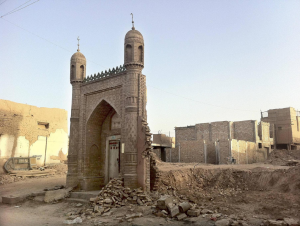As a Uyghur, it is deeply meaningful for me to honor the memory of the 6 million Jews murdered in the Holocaust. Together with individuals of conscience worldwide, Uyghurs will never forget the atrocities committed by Nazi Germany and its collaborators, in a unique act of evil that will forever haunt our modern civilization.
On this day of solemn remembrance, it is fitting to reflect on the words of a Holocaust survivor whose tireless work for human rights is legendary, the late Congressman Tom Lantos: “The veneer of civilization is paper thin. We are its guardians, and can never rest.”
For Uyghurs, it is not only our families and our people who are at risk in the face of the Chinese government’s atrocities against our people. We are also asking whether civilization itself is at risk, if governments and corporations continue “business as usual” with the Chinese government during ongoing mass atrocities. As Anne Applebaum put it in a column in February 2019, “In China, ‘never again’ is happening again.”
The much-missed Washington Post columnist Fred Hiatt issued another warning in November 2019: In China, every day is Kristallnacht, the Nazi destruction of Jewish synagogues and cemeteries as a special target during the “Night of Broken Glass.” The column points out the lessons to be drawn from UHRP’s documentation of the demolition and desecration of over 15,000 Uyghur mosques and cemeteries. When a government authorizes the obliteration of houses of worship and the resting place even of the dead, what is next?
Jewish World Watch (JWW), whose mission is inspired by the history of the Jewish people and the principle of Tikkun Olam (repairing the world), has been an early and steadfast partner in fighting China’s 21st century genocide. During Passover two years ago, JWW brought a “Uyghur Freedom Seder Haggadah” to interfaith gatherings across the country. Citing the Jewish history of exile and its lessons — “In every generation each of us is obliged to regard ourself as if we ourselves went forth from the land of Egypt” (Exodus 13:8) — this Haggadah gives hope to Uyghurs. Its themes deeply resonate for us: “From Sleep to Awakening, from Slavery to Freedom, from Silence to Protest, and from Brokenness to Repair.”
We take hope from Elisha Wiesel’s choice, honoring the legacy of his father, Holocaust survivor Elie Wiesel, to use his U.N. General Assembly address on International Holocaust Memorial Day last year as a chance to highlight the ongoing atrocities against Uyghurs. Uyghurs also take hope from the unflagging determination of the members of Adas Israel Congregation in Washington, D.C., to hold silent vigils, walking from the synagogue’s Garden of the Righteous to the Chinese Embassy, month in and month out, bearing witness to the suffering of the Uyghurs.
Just over a year ago, a landmark resolution by the U.S. House of Representatives condemned the Chinese government’s crimes as “ongoing genocide and crimes against humanity” against the Uyghurs and other Turkic Muslim peoples. Rep. Michael McCaul noted the historical significance of the resolution: “Congress has rarely invoked the Genocide Convention — it is a historic day.” He added that the world’s response to this crime is a test of the post-World War II system designed to stop these atrocities, and that the Convention on the Prevention and Punishment of the Crime of Genocide was created in response to the atrocities of the Holocaust.
The House resolution followed a report by the United States Holocaust Memorial Museum’s Simon-Skjodt Center for the Prevention of Genocide: “To Make Us Slowly Disappear.” The report detailed the crimes against humanity that the Chinese government is committing against the Uyghur population including forced sterilization, sexual violence, enslavement, torture, forcible transfer, persecution, and imprisonment or other severe deprivation of physical liberty.
The Chinese authorities’ efforts to stamp out Uyghur identity continue. In November, UHRP published evidence that the Chinese government is systematically imposing forced interethnic marriages on Uyghur women with the aim of completely assimilating Uyghurs into the dominant Han culture. On this day of remembrance, I reflect on the Jewish history of resistance to assimilation.
In late 2022, we mourned the dozens of Uyghurs who lost their lives in a fire in Urumqi (Ürümchi). By all credible accounts, government-imposed “zero COVID” measures to block building exits, which disproportionately impacted Uyghur residents, prevented their escape from the apartment building. Episodes like this underscore the dehumanization of Uyghurs by the Chinese regime.
On International Holocaust Remembrance Day, we remember the singular experience of the Jewish people, targeted for unspeakable horrors on an industrial scale. Solemn remembrance of the Holocaust is important for all humanity. And for Uyghurs, in our current crisis, “Never Forget” and “Never Again” have a direct and profound meaning. In the spirit of remembrance and of action, I express my gratitude to the Jewish community and to the many others who are advocating for universal human rights and continuing to demand “Never Again” in defense of the Uyghur people.

































